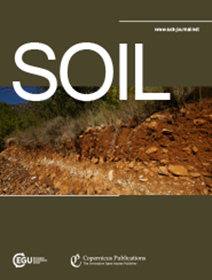西北欧模拟干旱夏季期间地下水深度对表土有机物矿化的影响
IF 5.8
2区 农林科学
Q1 SOIL SCIENCE
引用次数: 0
摘要
摘要由于气候变化预计将加剧干旱的发生和严重程度,地下水位(GWT)深度和毛细管上升对表土水分的控制可能会成为生物活动的关键驱动因素。因此,地下水位深度可能会影响表土碳矿化。在这项研究中,我们在实验室将三种不同质地(壤土、砂壤土和粉砂壤土)的未扰动 200 厘米长的土柱置于两种人工 GWT 深度(-165 厘米和-115 厘米)下。我们考察了:(1)沿土壤剖面毛细管上升的水分供应情况,特别是顶部 20 厘米土壤的水分供应情况;以及(2)因此而产生的 GWT 对添加了 13C 富集基质(黑麦草)的分解的影响。GWT 深度相差 50 厘米(-165 厘米对-115 厘米)导致沙质壤土(31% 对 38% 充水孔隙度 (WFPS))和粉砂质壤土(33% 对 43% 充水孔隙度 (WFPS))表层土壤湿度不同。在壤质砂土中,GWT 引起的湿度差异只出现在 GWT 以上 85 厘米处。在较浅的 GWT 条件下,添加的黑麦草矿化加速的预期并未得到证实。相反,在较干燥的 -165 厘米 GWT 土壤中,湿润事件后的碳矿化脉冲甚至更高。在淤泥质壤土中,毛细管上升对表土水分的贡献最大,在较浅的 GWT 条件下,稳定的 Cryegrass 池的矿化率也较低。这些发现表明,表层土壤水分增加对黑麦草矿化的潜在毛细管上升效应可能已被其他过程抵消。我们推测,在较深的 GWT 水平下,较干燥的表层土壤重新湿润后,桦树效应可能会被放大,与较浅的 GWT 水平下土壤持续较湿润的情况相比,最终会增强矿化作用。根据我们的研究结果,要充分模拟西北欧过去夏季干旱期间表层土壤的湿度,就必须包括 GWT 针对不同土壤质地的毛细管供应过程,这取决于 GWT 和土壤质地的组合。然而,对表土碳矿化的净影响是复杂的,正确模拟碳矿化可能需要进一步整合与土壤水分状态波动有关的特定过程,如桦树效应。本文章由计算机程序翻译,如有差异,请以英文原文为准。
The effect of groundwater depth on topsoil organic matter mineralization during a simulated dry summer in North-West Europe
Abstract. With climate change expected to intensify the occurrence and severity of droughts, the control of groundwater table (GWT) depth and capillary rise on topsoil moisture may render a critical driver of biological activity. Consequently, GWT depth could influence topsoil carbon mineralization. In this study, undisturbed 200 cm long soil columns of three different textures (loamy sand, sandy loam and silt loam) were subjected to two artificial GWT depths (–165 cm and –115 cm) in the laboratory. We examined (1) moisture supply by capillary rise along the soil profile and specifically into the top 20 cm soil, and (2) consequently the effect of GWT on decomposition of an added 13C-enriched substrate (ryegrass) over a period of ten weeks, with limited water applications representing a dry summer. A 50 cm difference in GWT depth (–165 cm vs. –115 cm) resulted in different topsoil moisture for the sandy loam (31 % vs. 38 % Water-filled pore space (WFPS)) and silt loam (33 % vs. 43 % WFPS) soils. In the loamy sand soil, GWT-induced moisture differences appeared only up to 85 cm above the GWT. The expected acceleration of mineralization of the added ryegrass under a shallower GWT was not confirmed. In contrast, C mineralization pulses after the wetting events were even higher for the drier –165 cm GWT soils. For the silt loam soil, where capillary rise supply had the largest contribution to topsoil moisture, a lower mineralization rate of the stable Cryegrass pool was also found with shallower GWT. These findings suggest that a potential capillary rise effect of increased topsoil moisture on ryegrass mineralization might have been counteracted by other processes. We postulate that the Birch effect might have been magnified following the rewetting of drier topsoils under deeper GWT levels, ultimately enhancing mineralization compared to where the soil remains consistently wetter under shallower GWT levels. Based on our findings, including the process of texture-specific capillary supply from the GWT can be required to adequately simulate moisture in the topsoil during droughts as they occurred over the past summers in North-West Europe, depending on GWT and texture combination. However, the net effect on topsoil C mineralization is complex and correct simulation of C mineralization may require further integration of specific processes connected to fluctuating soil moisture state, such as the Birch effect.
求助全文
通过发布文献求助,成功后即可免费获取论文全文。
去求助
来源期刊

Soil
Agricultural and Biological Sciences-Soil Science
CiteScore
10.80
自引率
2.90%
发文量
44
审稿时长
30 weeks
期刊介绍:
SOIL is an international scientific journal dedicated to the publication and discussion of high-quality research in the field of soil system sciences.
SOIL is at the interface between the atmosphere, lithosphere, hydrosphere, and biosphere. SOIL publishes scientific research that contributes to understanding the soil system and its interaction with humans and the entire Earth system. The scope of the journal includes all topics that fall within the study of soil science as a discipline, with an emphasis on studies that integrate soil science with other sciences (hydrology, agronomy, socio-economics, health sciences, atmospheric sciences, etc.).
 求助内容:
求助内容: 应助结果提醒方式:
应助结果提醒方式:


